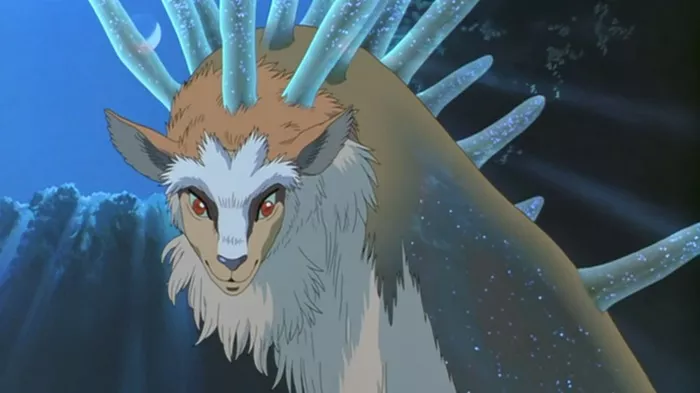Princess Mononoke,” directed by the renowned Hayao Miyazaki, is a masterful work of animation that weaves together themes of environmentalism, spirituality, and the struggle between humanity and nature. At the heart of this epic tale is the enigmatic Forest Spirit, a central figure representing the delicate balance and interconnectedness of the natural world. This article delves into the significance of the Forest Spirit in “Princess Mononoke”, exploring its symbolism, origins, and profound impact on the narrative.
Unveiling the Forest Spirit
The Forest Spirit, also known as the Shishigami or Deer God, is a mystical entity that inhabits the ancient forests of the film’s setting. It is depicted as a serene and ethereal being with the body of a deer and a face resembling an otherworldly mask. The Forest Spirit is revered by the creatures of the forest and plays a crucial role in maintaining the balance of nature.
Dual Nature of the Forest Spirit
One of the most intriguing aspects of the Forest Spirit is its dual nature, embodying both creation and destruction. During the day, it appears as a gentle and benevolent deity, bestowing life and vitality upon the forest and its inhabitants. However, at night, it transforms into a more ominous and vengeful form, capable of unleashing devastating wrath upon those who threaten the natural world.
Symbolism and Allegory
Representation of Nature
The Forest Spirit serves as a powerful symbol of nature’s complexity and resilience. Its ever-changing form mirrors the dynamic and cyclical nature of ecosystems, which undergo constant transformation and renewal. Through the Forest Spirit, Miyazaki highlights the interconnectedness of all living beings and the profound impact of human actions on the environment.
Struggle for Survival
In “Princess Mononoke,” the Forest Spirit becomes embroiled in the conflict between the forest gods and the encroaching forces of industrialization and human greed. Its struggle to maintain balance reflects the larger battle for survival faced by the natural world in the face of human exploitation and destruction. The Forest Spirit’s plight serves as a poignant reminder of the consequences of environmental degradation and the importance of preserving our planet’s fragile ecosystems.
Spiritual Symbolism
Beyond its role as a symbol of nature, the Forest Spirit also carries spiritual significance within the film’s narrative. It is worshipped as a deity by the inhabitants of the forest, who offer prayers and sacrifices in reverence. The Forest Spirit’s connection to the spiritual realm underscores the film’s exploration of humanity’s relationship with the divine and the sacredness of the natural world.
Origins and Mythology
Influences from Japanese Folklore
The concept of the Forest Spirit draws inspiration from various elements of Japanese folklore and mythology. In Shinto belief, nature is imbued with kami, or spirits, that inhabit natural phenomena such as mountains, rivers, and forests. The Forest Spirit embodies this reverence for nature and the belief in the divine presence within the natural world.
Deer Symbolism
The deer holds significant symbolism in Japanese culture, often associated with themes of purity, spirituality, and the supernatural. In “Princess Mononoke,” the Forest Spirit’s deer-like appearance evokes these cultural associations, linking it to broader themes of reverence for nature and the spiritual realm.
Impact on the Narrative
Catalyst for Conflict
The Forest Spirit’s presence serves as a catalyst for the conflict that drives the plot of “Princess Mononoke.” As industrialization encroaches upon the forest, humans seek to exploit the spirit’s powers for their own gain, leading to a violent struggle for control. The Forest Spirit’s dual nature heightens the tension and uncertainty surrounding its role in the unfolding events.
Moral Ambiguity
One of the most compelling aspects of the Forest Spirit is its moral ambiguity, blurring the lines between good and evil. While it embodies the forces of nature and serves as a protector of the forest, it also wields destructive power in its nighttime form. This ambiguity challenges viewers to question their assumptions and consider the complexities of the natural world and humanity’s relationship with it.
Redemption and Renewal
Despite the turmoil and destruction wrought by human greed, the Forest Spirit ultimately embodies themes of redemption and renewal. In the film’s climactic moments, it unleashes its full power, cleansing the land of corruption and restoring balance to the forest. This act of divine intervention offers hope for the future and underscores the resilience of nature in the face of adversity.
Conclusion
The Forest Spirit in “Princess Mononoke” stands as a powerful symbol of nature’s complexity and the interconnectedness of all living beings. Through its dual nature, spiritual symbolism, and impact on the narrative, the Forest Spirit transcends its role as a mere character and becomes a profound allegory for humanity’s relationship with the natural world.
As viewers journey through the rich tapestry of “Princess Mononoke,” they are invited to contemplate the consequences of environmental destruction, the importance of preserving our planet’s precious ecosystems, and the enduring power of nature to heal and renew. In the Forest Spirit, we find not only a captivating character but also a timeless emblem of hope and redemption in a world teetering on the brink of chaos.

